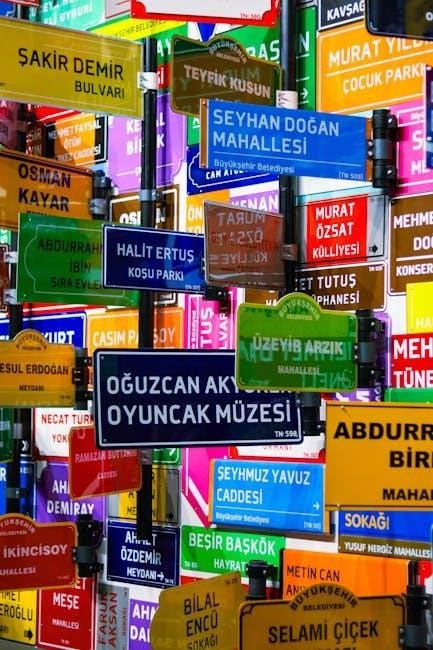The 99 Names of Muhammad, known as Asma-e-Muhammad, are revered titles reflecting his divine attributes and noble character, sourced from the Quran and Hadith.
1.1. Significance of the Names in Islamic Tradition
The 99 Names of Muhammad hold profound significance in Islamic tradition, embodying his divine attributes and noble character. These names, derived from the Quran and Hadith, are a source of spiritual guidance and inspiration. Muslims recite them in prayers and supplications to seek blessings and connection with the Prophet. Each name reflects a unique virtue, fostering a deeper understanding of his role as a mercy to humanity. Reciting these names is believed to bring blessings and foster a closer relationship with the Prophet Muhammad (PBUH).
1.2. Sources of the Names in the Quran and Hadith
The 99 Names of Muhammad are primarily derived from the Quran and authentic Hadith. The Quran refers to Muhammad as “Ahmad” (61:6) and “Hamid” (17:79), highlighting his praised status. Hadith collections, such as those by Bukhari and Muslim, provide additional names and their meanings. Early scholars meticulously compiled these names from divine revelations and prophetic traditions, ensuring their authenticity. These sources serve as the foundation for understanding the Prophet’s attributes and their significance in Islamic worship and spirituality.
List of the 99 Names of Muhammad (PBUH)
The list includes names like Muhammad (مُحَمَّد), Ahmad (أَحْمَد), Haamid (حَامِد), Mahmood (مَحمُود), and Qaasim (الْقَاسِم), each with its Arabic text and English translation.
2.1. Arabic Text and English Translations
The 99 Names of Muhammad are presented in their original Arabic form, accompanied by English translations to facilitate understanding. Each name, such as “Muhammad” (مُحَمَّد), meaning “Praised,” and “Ahmad” (أَحْمَد), meaning “Most Commendable,” is carefully transliterated and explained. These translations help non-Arabic speakers connect with the profound meanings embedded in the names. PDF resources often include both the Arabic script and its English equivalent, ensuring accessibility for a global audience while preserving the linguistic beauty of the original text.
2.2. Meanings and Virtues Associated with Each Name

Each of the 99 Names of Muhammad carries profound meanings and virtues, highlighting the Prophet’s divine qualities. For instance, “Rasheed” signifies guidance, while “Noor” embodies light. These names not only describe his character but also serve as a source of spiritual inspiration. Reciting them is believed to bring blessings and foster a deeper connection with the Prophet. PDF resources often elaborate on these virtues, providing insights into their significance and application in daily life, enriching one’s faith and practice.

Historical Context and Compilation
The compilation of Muhammad’s 99 names traces back to early Islamic scholars, drawing from the Quran and Hadith; Sufism later popularized these names, emphasizing their spiritual significance.
3.1. Early Scholars and Their Contributions
Early Islamic scholars, such as Imam al-Bayhaqi, played a pivotal role in compiling and interpreting the 99 names of Muhammad (PBUH). These scholars meticulously sourced the names from the Quran and Hadith, providing profound explanations of their meanings and virtues. Their work laid the foundation for understanding the prophetic attributes and their significance in Islamic tradition. The contributions of these scholars remain invaluable, offering insights into the spiritual and theological depth of the names, which continue to inspire and guide believers today.
3.2. The Role of Sufism in Popularizing the Names
Sufism played a significant role in popularizing the 99 Names of Muhammad (PBUH) by integrating them into devotional practices and mystical rituals. Sufi mystics emphasized the spiritual connection and divine grace associated with reciting these names, often incorporating them into poetry, songs, and meditative exercises. Their teachings highlighted the profound meanings and blessings of the names, making them more accessible and revered among the masses. This mystical approach deepened the emotional and spiritual bond of believers with the Prophet, fostering a wider acceptance and dissemination of the names across Islamic cultures.

Spiritual Benefits of Reciting the Names
Reciting the 99 Names of Muhammad brings numerous spiritual benefits, including divine blessings, healing, and eternal rewards, fostering a deeper connection with the Prophet’s teachings.
4.1. Blessings and Rewards in the Hereafter
Reciting the 99 Names of Muhammad is believed to bring immense blessings and rewards in the Hereafter. It is said to grant forgiveness, elevate one’s status in Paradise, and attract divine mercy. Many scholars emphasize that consistent recitation ensures a favorable position on the Day of Judgment, as it reflects devotion and love for the Prophet (PBUH). These sacred names are also thought to serve as a means of intercession, further highlighting their spiritual significance in Islamic tradition and practice.
4.2. Healing and Spiritual Growth Through Recitation
Reciting the 99 Names of Muhammad is believed to foster spiritual growth and healing. It brings comfort, peace, and emotional relief, while enhancing one’s connection to the Prophet (PBUH) and Allah. Regular recitation is thought to purify the heart, strengthen faith, and guide individuals toward righteousness. Many Muslims find solace in these names, using them as a tool for self-refinement and moral excellence, ultimately seeking divine grace and spiritual elevation through their recitation.

Availability of the 99 Names in PDF Format
The 99 Names of Muhammad are widely available in PDF format online, offering English, Urdu, and Arabic translations with meanings and historical context for easy access and study.

5.1. Reliable Sources for Download
Several reputable websites offer free PDF downloads of the 99 Names of Muhammad, including Open Library, Vecteezy, and Islamic archives. These sources provide high-quality, authentic documents with translations in multiple languages like English, Urdu, and Arabic. Many platforms ensure the files are verified for accuracy and cultural sensitivity. Users can easily search and download these PDFs, which often include meanings, virtues, and historical context. Ensure to verify the authenticity of the source before downloading to maintain the integrity of the content.
5.2. Language Variations (English, Urdu, Arabic)
PDFs of the 99 Names of Muhammad are available in multiple languages to cater to diverse audiences. English translations provide accessible meanings for non-Arabic speakers, while Urdu versions are popular in South Asia. Arabic texts maintain the original script and pronunciation. Many PDFs include both Arabic and English or Urdu translations, ensuring accessibility and understanding. Some documents also offer transliterations, aiding readers unfamiliar with Arabic script. This linguistic diversity ensures that devotees worldwide can engage with the Names in their preferred language, enhancing spiritual connection and comprehension.
Cultural and Religious Practices
The 99 Names of Muhammad are deeply integrated into Islamic culture, recited in prayers, supplications, and religious ceremonies, fostering spiritual growth and community bonding worldwide.
6.1. Incorporation in Daily Prayers and Supplications
Muslims worldwide incorporate the 99 Names of Muhammad into their daily prayers and supplications, seeking blessings and guidance. These names are often recited during specific rituals, such as after the five daily prayers, in morning and evening adhkar, and during times of personal reflection. Reciting these names is believed to bring spiritual comfort and strengthen one’s connection to the Prophet (PBUH). Many find solace in their meanings, which inspire virtues like gratitude and compassion. This practice is deeply rooted in Islamic tradition and is encouraged as a means of drawing closer to Allah.
6.2. Artistic and Literary Representations
The 99 Names of Muhammad are beautifully represented in Islamic art and literature, reflecting deep spiritual reverence. Calligraphy and illuminated manuscripts are popular mediums, showcasing the names in intricate designs. Poetry and prose often celebrate these titles, emphasizing their profound meanings. These artistic expressions are not only aesthetically pleasing but also serve as tools for spiritual reflection. They are frequently displayed in homes, mosques, and cultural spaces, inspiring devotion and admiration for the Prophet (PBUH). Such representations bridge art and faith, enriching Muslim heritage globally.
The 99 Names of Muhammad (PBUH) are a timeless treasure, offering spiritual guidance and divine connection. Their availability in PDF formats ensures easy access for reflection and inspiration.

7.1. The Enduring Legacy of the Names
The 99 Names of Muhammad (PBUH) hold a profound and lasting impact, reflecting divine attributes and virtues. Rooted in the Quran and Hadith, these names have inspired devotion, art, and literature for centuries. Their timeless relevance continues to guide Muslims in worship and daily life, fostering spiritual growth and connection. The availability of these names in PDF formats has further preserved their legacy, ensuring accessibility for future generations to draw blessings and inspiration from Prophet Muhammad’s sacred titles.
7.2. Encouragement to Explore and Reflect
Muslims are encouraged to explore the 99 Names of Muhammad (PBUH) deeply, as they offer profound spiritual insights and blessings. Reflecting on these names fosters a stronger connection to the Prophet’s teachings and character. Available in PDF formats, these names are easily accessible for study, enabling believers to incorporate them into daily prayers and supplications. By understanding their meanings, individuals can gain spiritual growth, guidance, and a deeper appreciation for the Prophet’s divine mission, ultimately drawing closer to Allah through his revered names.

